 Ever wish you had the chance to give your younger self a nice, hard slap across the face?
Ever wish you had the chance to give your younger self a nice, hard slap across the face?
There are times when I wonder just what the hell I was thinking when I became a Republican --- or whether I was even thinking at all. Next month will mark one of those times, as it will be the twentieth anniversary of a happy event that I turned into a miserable one --- by making a shortsighted decision with severe personal and political consequences...
In October 1993, a Boston Globe Magazine editor named John Koch visited my Advanced Placement English class at Boston Latin School to discuss an upcoming special edition of the magazine featuring essays from students in the Boston area, and to encourage my class to submit articles for the magazine's consideration. I was a bit nervous about submitting an article, but ultimately decided to write a piece about my experiences being teased and harassed for prioritizing education --- the so-called "acting white" phenomenon.
I was thrilled to learn later that the piece had been accepted for publication --- surprisingly, without any changes or edits. I never would have imagined seeing my name in the Globe, and now it was going to happen.
I remember being irked by the title on the cover of the February 6, 1994 Boston Globe Magazine: "In Our Own Words: A Special Issue By and About Urban Youth." The use of the term "urban youth" made it sound to me as though the articles had been written by gangbangers. Yet I couldn't complain too much: whatever grievances I had with that subtitle were offset by the honor of finally seeing my words in a commercial publication for the first time.
My article, "White Man's Knowledge," appeared on page 29. In the piece [posted in full below this article], I described my frustration with the "acting white" phenomenon I had experienced over the years:
What is the cause of such a disdainful attitude toward those African-American youths who are striving to get ahead? I confess my ignorance as to the exact reason. It could be a matter of poverty, apathy, jealousy or laziness. The black youths who express scorn for their studious counterparts may not have had a father or a mother to read a book to them when they were 5 or 6 years of age. So when filmmaker John Singleton expresses his desire for teachers to be considered 'bastions of society,' most black youths are unreachable. Why? Because the statements of Singleton and Spike Lee are printed in newspapers, magazines, and books, something that these youths may have had limited exposure to. How can you respect something that you are not familiar with?
It is pitiful to think that blacks who strive to improve themselves through education must resign themselves to passively accepting backbiting comments in their youth by others of the same color who decide to remain in ignorance. It is pitiful to think that instead of being praised for seeking to empower their race, they are rejected for 'learning the white man's knowledge' (as if Caucasians were the only ones who contributed to literature, science, and mathematics). It is pitiful to think that the black youths who respect themselves by striving for academic excellence are treated with so much disrespect.
I was honored by the positive feedback I received from Latin School students and teachers --- and a little embarrassed, since the magazine featured pieces from fellow Latin School students who were far ahead of me in terms of writing ability. Nevertheless, I felt compelled to build upon whatever momentum I had generated with the piece, and followed up with several articles in the Latin School newspaper, the Argo.
Of course, by the time the Globe Magazine article had been published, I had become a huge fan of libertarian Boston talk-radio star David Brudnoy, as well as right-wing syndicated columnists Ken Hamblin, Thomas Sowell, Armstrong Williams and Walter E. Williams, all of whom appeared in the Boston Herald. Later that month, another right-wing pundit, former Herald editorial writer Jeff Jacoby, started writing for the Globe op-ed page, and I became a fan of his as well. One reason why I embraced these individuals was that they were all, to varying degrees, harshly critical of Nation of Islam leader Louis Farrakhan, who I regarded as an extremist of the highest order and the number-one threat to civility among the races. Jacoby in particular mirrored my contempt for Farrakhan, most notably in this March 15, 1994 column.
I recognized in Jacoby, Brudnoy and the black Republican syndicated columnists a passion, a vision, a direction for the world that I did not recognize in the Boston Globe editor Koch. I also recognized that if I wanted to become a black Republican pundit myself one day, it probably wouldn't be a good idea to note that my writing career began in such a "liberal" paper (Jacoby was seen as the paper's token right-wing columnist). So in 1995, I abruptly cut off all communication with Koch, and began downplaying any connection to the paper, telling virtually anyone who asked that the only thing good about the paper was Jacoby. In fact, this article represents the first time I've told most people that I once had an article published in the Globe.
Even after I decided to leave the Republican Party in 2011, having become disgusted by the party's "epistemic closure" on such issues as climate change, I still felt embarrassed about mentioning my past with the paper --- largely because I would have to explain why I chose to sever ties in such an abrupt and ungrateful fashion.
I've often thought about writing to Koch (who left the Globe several years ago and is now an accomplished artist) and apologizing to him for my actions in 1995, but I've never done so, simply because if I were in his shoes, I would never, under any circumstances, accept such an apology. How can someone who holds grudges ask someone else not to hold a grudge?
This is one wound --- a wound I inflicted --- that will never, and can never, heal.
I can't ask myself for forgiveness, either. I wish I had not been so stupid as to fall for the media hype about Farrakhan twenty years ago. Had I understood that Farrakhan was not nearly as important or powerful as mainstream media entities were making him out to be (and I actually thought he was going to start a race war against white people), I never would have been so spooked as to embrace right-wing pundits who downplayed the declarations of demagogues with actual political power while denouncing Farrakhan.
(As I write this, I'm reminded of a conversation I had with a Democratic friend several years ago, in which I asked why more Jewish people don't publicly condemn Farrakhan. My friend smiled and observed that if I actually knew a critical mass of Jewish people, I would have long ago realized that most Jewish people regarded right-wing Republican Christian fundamentalists as the greatest threat to their liberty, not Farrakhan.)
Had I not fallen for the media hype about Farrakhan, and thus not aligned myself with the anti-Farrakhan right, I would have never felt motivated to sever ties with Koch. I would have never tuned into right-wing talk radio and bought into the notions promoted in that medium, such as the notion of human-caused climate change being a "hoax." I would have never defended the views of such figures as Jacoby, Brudnoy, Hamblin and Sowell as representing the views of "real" or "rational" America. I would have never made the catastrophic mistake of voting for the likes of George W. Bush. I would have never wasted nearly two decades of my life on wingnuttery.
As the singer Charlotte Church once observed, even God can't change the past. Yet I still wish I could --- or at the very least, I wish I had enough common sense twenty years ago to understand that mainstream media entities were simply attempting to get ratings and sales by focusing on Farrakhan, and that his message was never particularly popular even among most African-Americans.
In numerous conversations over the past three years, I've been told that I shouldn't beat myself up too much over my past association with the Republican Party and the conservative movement, that millions of well-meaning people (mistakenly) thought that the GOP was a legitimate and rational political option, that people make mistakes. However, I can't accept this line of argument. Other people I knew recognized immediately that the right was wrong twenty years ago. Why didn't I?
I keep trying to look for answers beyond the Farrakhan issue. I've noted previously that I was a fan of President George H. W. Bush, and I remember having a negative reaction in 1991 to those who suggested that Supreme Court nominee Clarence Thomas was a self-hating black man. Yet I didn't hate Bill Clinton when he ran for and won the presidency, and prior to following right-wing media I considered myself pro-choice and pro-equal rights for gay people. Absent the "fear of Farrakhan," I think I would have remained a generally socially liberal person, instead of leaping over the right-wing cliff. In fact, had I avoided right-wing media influences, I'd like to think that I would have developed an awareness about the hazards of human-caused climate change years ago.
What made me get so worked up by the Farrakhan stuff? Why didn't I realize that it was just media hype, sound and fury signifying virtually nothing? Why couldn't I recognize (what should have been) obvious media trickery --- the same obvious media trickery that manifests itself every so often, from the hype about weapons of mass destruction in the run-up to the war in Iraq to the hype about the allegedly grassroots Tea Party movement to the hype about the "knockout game"? The only answer I can come up with is that I simply wasn't as smart as I thought I was.
I can certainly recognize obvious media trickery today --- the hype about Benghazi, the fake scandals promoted by the late Andrew Breitbart, the fear-mongering about obscure academics such as Frances Fox Piven --- but that doesn't make up for not being able to recognize obvious media trickery when it counted.
I can't exactly celebrate the twentieth anniversary of my first published piece. It's a self-ruined memory. I spent too many years not acknowledging the piece and denigrating the venue in which it was published to "celebrate" it now.
Frankly, it wasn't as good as the pieces written by my Boston Latin classmates. At the time it was published, I had developed what would turn out to be an emotionally expensive, psychologically punishing addiction --- and it has to be referred to as such, because that's what it was --- to right-wing media. I betrayed the man who gave me the opportunity to write the piece, for no other reason than to score political points. And it wasn't worth it at all.
You know the old saying, "Time heals all wounds"? That's absolute BS. It doesn't apply when you've wounded yourself, and others.
D.R. Tucker is a Massachusetts-based freelance writer and a former contributor to the conservative website Human Events Online. He has also written for the Huffington Post, the Boston Herald, the Boston Globe, ClimateCrocks.com, FrumForum.com, the Ripon Forum, Truth-Out.org, TheNextRight.com, and BookerRising.com. In addition, he hosted a Blog Talk Radio program, The Notes, from August 2009 to June, 2010. You can follow him on Twitter here: @DRTucker.
The full text of 16-year old Tucker's essay, "White Man's Knowledge", as published in the February 6, 1994 special issue of The Boston Globe Magazine, follows below...







 'Green News Report' 9/18/25
'Green News Report' 9/18/25
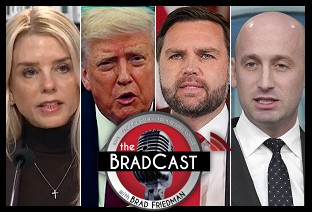 MAGA Exploiting Kirk's Death as Their 9/11: 'BradCast' 9/17/25
MAGA Exploiting Kirk's Death as Their 9/11: 'BradCast' 9/17/25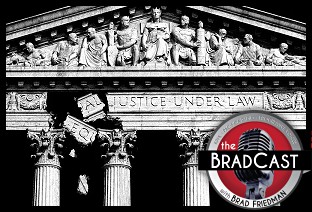 Our Crumbling Courts and Withering Rule of Law: 'BradCast' 9/16/25
Our Crumbling Courts and Withering Rule of Law: 'BradCast' 9/16/25 'Green News Report' 9/16/25
'Green News Report' 9/16/25 After Kirk Murder, First Amendment, But Not Second, Under Attack. Prove Me Wrong: 'BradCast' 9/15/25
After Kirk Murder, First Amendment, But Not Second, Under Attack. Prove Me Wrong: 'BradCast' 9/15/25 Sunday 'False Narrative' Toons
Sunday 'False Narrative' Toons SCOTUS Suspension of 4th Amendment Rights Poses Ominous Threat to Constitutional Republic
SCOTUS Suspension of 4th Amendment Rights Poses Ominous Threat to Constitutional Republic 'Dark Moment for America': 'BradCast' 9/11/25
'Dark Moment for America': 'BradCast' 9/11/25 Kirk Assassinated in UT; Shutdown Battle Takes Shape in D.C.: 'BradCast' 9/10/25
Kirk Assassinated in UT; Shutdown Battle Takes Shape in D.C.: 'BradCast' 9/10/25 Despite Voting Co. Lawsuit, Fox Ready to Shout Fake 'Fraud' Again: 'BradCast' 9/9
Despite Voting Co. Lawsuit, Fox Ready to Shout Fake 'Fraud' Again: 'BradCast' 9/9  'Green News Report' 9/9/25
'Green News Report' 9/9/25 Trump Readies Wars on Venezuela and Chicago: 'BradCast' 9/8/25
Trump Readies Wars on Venezuela and Chicago: 'BradCast' 9/8/25 Sunday 'Big Ball Room' Toons
Sunday 'Big Ball Room' Toons 'Green News Report' 9/4/25
'Green News Report' 9/4/25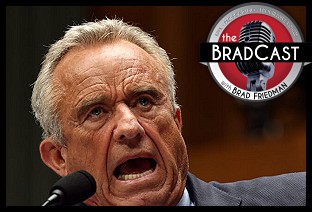 RFK Jr.'s War on the Science of Public Health: 'BradCast' 9/4/25
RFK Jr.'s War on the Science of Public Health: 'BradCast' 9/4/25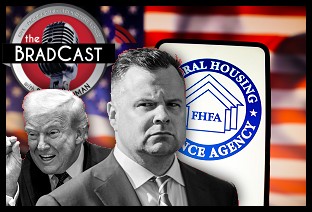 Trump's 'Cook'ed-Up Mortgage Fraud Claims: 'BradCast' 9/3/25
Trump's 'Cook'ed-Up Mortgage Fraud Claims: 'BradCast' 9/3/25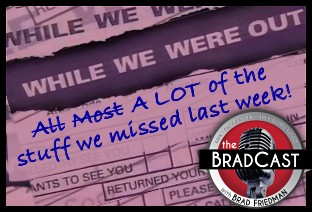 While We Were Out: 'BradCast' 9/2/25
While We Were Out: 'BradCast' 9/2/25 Hypocrisy Behind RW Opposition To CA 'Election Rigging Response Act'
Hypocrisy Behind RW Opposition To CA 'Election Rigging Response Act'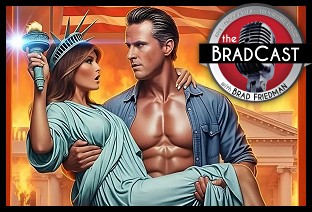 CA's 'Deterrence' Map; Trump's 'Fascist Theatre': 'BradCast' 8/21/25
CA's 'Deterrence' Map; Trump's 'Fascist Theatre': 'BradCast' 8/21/25 Trump's 'Stalinesque' Plot to Whitewash History: 'BradCast' 8/20/25
Trump's 'Stalinesque' Plot to Whitewash History: 'BradCast' 8/20/25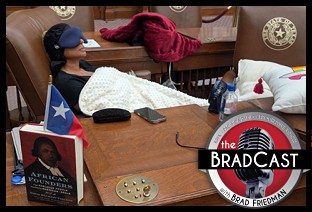 TX GOP Imprisons Dem State Lawmaker in State House: 'BradCast' 8/19/25
TX GOP Imprisons Dem State Lawmaker in State House: 'BradCast' 8/19/25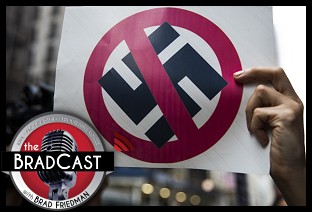 Trump, Nazis and Trump's Nazified Elections: 'BradCast' 8/18/25
Trump, Nazis and Trump's Nazified Elections: 'BradCast' 8/18/25
 VA GOP VOTER REG FRAUDSTER OFF HOOK
VA GOP VOTER REG FRAUDSTER OFF HOOK Criminal GOP Voter Registration Fraud Probe Expanding in VA
Criminal GOP Voter Registration Fraud Probe Expanding in VA DOJ PROBE SOUGHT AFTER VA ARREST
DOJ PROBE SOUGHT AFTER VA ARREST Arrest in VA: GOP Voter Reg Scandal Widens
Arrest in VA: GOP Voter Reg Scandal Widens ALL TOGETHER: ROVE, SPROUL, KOCHS, RNC
ALL TOGETHER: ROVE, SPROUL, KOCHS, RNC LATimes: RNC's 'Fired' Sproul Working for Repubs in 'as Many as 30 States'
LATimes: RNC's 'Fired' Sproul Working for Repubs in 'as Many as 30 States' 'Fired' Sproul Group 'Cloned', Still Working for Republicans in At Least 10 States
'Fired' Sproul Group 'Cloned', Still Working for Republicans in At Least 10 States FINALLY: FOX ON GOP REG FRAUD SCANDAL
FINALLY: FOX ON GOP REG FRAUD SCANDAL COLORADO FOLLOWS FLORIDA WITH GOP CRIMINAL INVESTIGATION
COLORADO FOLLOWS FLORIDA WITH GOP CRIMINAL INVESTIGATION CRIMINAL PROBE LAUNCHED INTO GOP VOTER REGISTRATION FRAUD SCANDAL IN FL
CRIMINAL PROBE LAUNCHED INTO GOP VOTER REGISTRATION FRAUD SCANDAL IN FL Brad Breaks PA Photo ID & GOP Registration Fraud Scandal News on Hartmann TV
Brad Breaks PA Photo ID & GOP Registration Fraud Scandal News on Hartmann TV  CAUGHT ON TAPE: COORDINATED NATIONWIDE GOP VOTER REG SCAM
CAUGHT ON TAPE: COORDINATED NATIONWIDE GOP VOTER REG SCAM CRIMINAL ELECTION FRAUD COMPLAINT FILED AGAINST GOP 'FRAUD' FIRM
CRIMINAL ELECTION FRAUD COMPLAINT FILED AGAINST GOP 'FRAUD' FIRM RICK SCOTT GETS ROLLED IN GOP REGISTRATION FRAUD SCANDAL
RICK SCOTT GETS ROLLED IN GOP REGISTRATION FRAUD SCANDAL VIDEO: Brad Breaks GOP Reg Fraud Scandal on Hartmann TV
VIDEO: Brad Breaks GOP Reg Fraud Scandal on Hartmann TV RNC FIRES NATIONAL VOTER REGISTRATION FIRM FOR FRAUD
RNC FIRES NATIONAL VOTER REGISTRATION FIRM FOR FRAUD EXCLUSIVE: Intvw w/ FL Official Who First Discovered GOP Reg Fraud
EXCLUSIVE: Intvw w/ FL Official Who First Discovered GOP Reg Fraud GOP REGISTRATION FRAUD FOUND IN FL
GOP REGISTRATION FRAUD FOUND IN FL

































